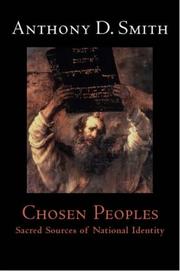| Listing 1 - 2 of 2 |
Sort by
|

ISBN: 0192100173 9780192100177 Year: 2003 Publisher: Oxford Oxford university press
Abstract | Keywords | Export | Availability | Bookmark
 Loading...
Loading...Choose an application
- Reference Manager
- EndNote
- RefWorks (Direct export to RefWorks)
'Unto thy seed I have given this land.' From the moment of God's covenant with Abraham in the Old Testament, the idea that a people are chosen by God has had a central role in shaping national identity. Chosen Peoples argues powerfully that sacred belief remains central to national identity, even in an increasingly secular, globalized modern world. In this important new study, Anthony D. Smith goes in search of the deep Judeo-Christian roots of the many manifestations of national identity. This rich and timely contribution to current debates about nationalism explains the complex historical reasons behind often violent modern conflicts around issues of land, culture, religion, and politics. Tracing the development of individual nations over many centuries, it offers fascinating insights into the religious and cultural foundations of countries such as Great Britain, the United States, Israel, France, and Germany. The argument draws on a wide range of examples from historic landscapes in Ireland, Switzerland and Egypt, myths of Arthurian Britain, Holy Russia, and Byzantium, through memories of a 'Golden Age', to the modern commemoration of the 'Glorious Dead', and of victims of war.
Covenants --- Election (Theology). --- Messianism, Political. --- Nationalism --- Political messianism. --- Religious aspects. --- Election (Theology) --- Alliances (Religion) --- Election (Théologie) --- Messianisme politique --- Election (Théologie) --- Political messianism --- Messianism, Political --- Messianism --- Nationalism and religion --- Predestination --- Salvation --- Covenants (Religion) --- Religious aspects --- Christianity --- Nationalisme --- Aspect religieux
Book
ISBN: 9782503570150 2503570151 9782503570167 250357016X Year: 2017 Volume: 26 Publisher: Turnhout, Belgium Brepols
Abstract | Keywords | Export | Availability | Bookmark
 Loading...
Loading...Choose an application
- Reference Manager
- EndNote
- RefWorks (Direct export to RefWorks)
Dans l'"Ecclesia" carolingienne, le conflit doctrinal est inextricablement lié aux luttes de pouvoir de la cour, aux tensions entre évêques, clercs, moines et laïcs, à la psychose des falsifications. Pour le décrire, une perspective multiple s'impose: analyse des réseaux à partir des sources diplomatiques, déconstruction du discours théologique à la recherche de sa raison sociale, et finalement survey des manuscrits en quête des notes marginales, réécritures et autres florilèges rassemblés à l'ombre du cloître. On mesure alors combien la controverse est structurée par le problème du contrôle de l'information, de la publicité et de l'opinion - autant de thèmes dont on recule souvent l'apparition à l'ère grégorienne, lorsque s'allument les premiers bûchers d'hérétiques de l'histoire occidentale.
Predestination --- Election (Theology) --- Church and state --- Prédestination --- Election (Théologie) --- Eglise et Etat --- History of doctrines --- Histoire des doctrines --- Europe --- Politics and government --- Politique et gouvernement --- Élection (théologie) --- Église et État --- Empire carolingien --- Civilisation --- Prédestination --- Election (Théologie) --- Gottschalk, --- Godescalc, --- Godescalcus, --- Godeschalk, --- Gottescalc, --- Foreordination --- 27 "08" --- Salvation --- Free will and determinism --- 27 "08" Histoire de l'Eglise--?"08" --- 27 "08" Kerkgeschiedenis--?"08" --- Histoire de l'Eglise--?"08" --- Kerkgeschiedenis--?"08" --- Christianity --- Religious aspects --- Middle Ages, 600-1500 --- Church controversies --- 9th century --- Church and state. --- Election (Theology). --- Politics and government. --- Predestination. --- 476-1500. --- Europe. --- Prédestination. --- Civilisation. --- Middle Ages, 500-1500
| Listing 1 - 2 of 2 |
Sort by
|

 Search
Search Feedback
Feedback About UniCat
About UniCat  Help
Help News
News